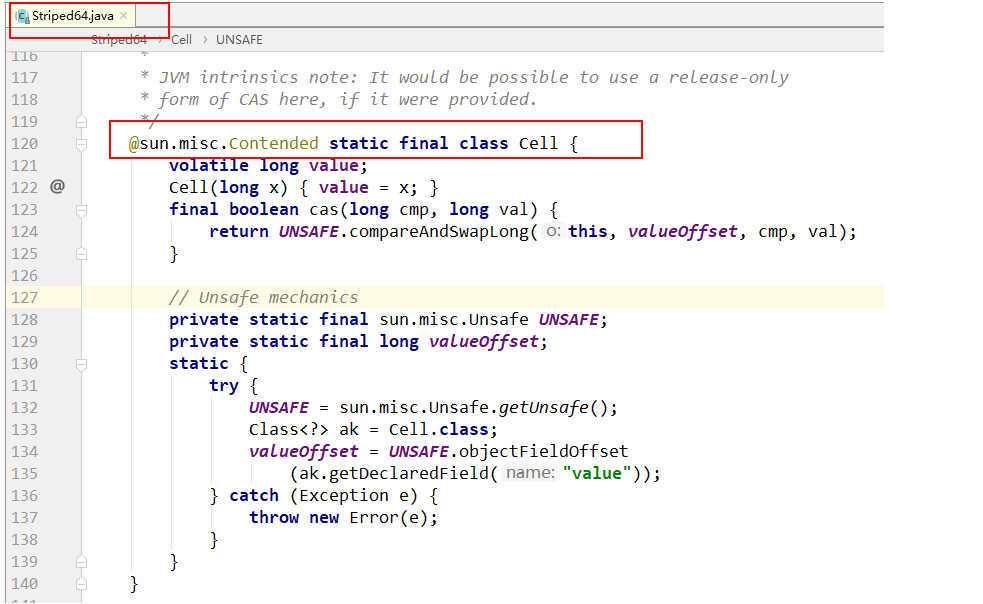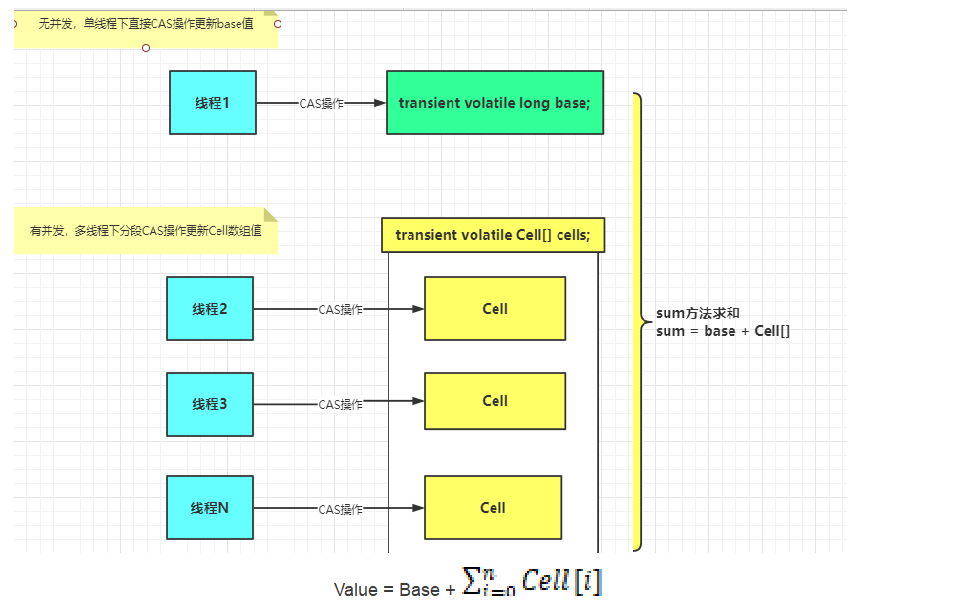Java开发手册
17.【参考】volatile 解决多线程内存不可见问题对于一写多读,是可以解决变量同步问题,但是如果多
写,同样无法解决线程安全问题。
说明:如果是 count++操作,使用如下类实现:
AtomicInteger count = new AtomicInteger();
count.addAndGet(1);
如果是 JDK8,推荐使用 LongAdder 对象,比 AtomicLong 性能更好(减少乐观锁的重试次数)
基本类型原子类
- AtomicInteger
- AtomicBoolean
- AtomicLong
常用API简介
- public final int get() //获取当前的值
- public final int getAndSet(int newValue)//获取当前的值,并设置新的值
- public final int getAndIncrement()//获取当前的值,并自增
- public final int getAndDecrement() //获取当前的值,并自减
- public final int getAndAdd(int delta) //获取当前的值,并加上预期的值
- boolean compareAndSet(int expect, int update) //如果输入的数值等于预期值,则以原子方式将该值设置为输入值(update)
举个栗子
import java.util.concurrent.CountDownLatch;
import java.util.concurrent.TimeUnit;
import java.util.concurrent.atomic.AtomicInteger;
class MyNumber {
AtomicInteger atomicInteger = new AtomicInteger();
public void addPlusPlus(){
atomicInteger.incrementAndGet();
}
}
public class AtomicIntegerDemo {
public static final int SIZE = 50;
public static void main(String[] args) throws InterruptedException {
MyNumber myNumber = new MyNumber();
CountDownLatch countDownLatch = new CountDownLatch(SIZE);
for (int i = 1; i <= SIZE; i++) {
new Thread(() -> {
try {
for (int j = 1 ;j <=1000; j++) {
myNumber.addPlusPlus();
}
}catch (Exception e){
e.printStackTrace();
}finally {
countDownLatch.countDown();
}
},String.valueOf(i)).start();
}
countDownLatch.await();
System.out.println(Thread.currentThread().getName()+"\t"+"---result : "+myNumber.atomicInteger.get());
}
}上述案例使用的AtomicInteger进行的类似累加的操作,底层使用的volatile来实现的,已经保障了可见性,所以数据一定是正确的。
之所以是CountDownLatch 是为了保障main线程输出结果的时候,所有的线程都已经完成了计算。
数组类型原子类
- AtomicIntegerArray
- AtomicLongArray
- AtomicReferenceArray
demo
import java.util.concurrent.atomic.AtomicIntegerArray;
public class AtomicIntegerArrayDemo {
public static void main(String[] args) {
AtomicIntegerArray atomicIntegerArray = new AtomicIntegerArray(5);
for (int i = 0; i <atomicIntegerArray.length(); i++) {
System.out.println(atomicIntegerArray.get(i));
}
System.out.println();
System.out.println();
System.out.println();
int tmpInt = 0;
tmpInt = atomicIntegerArray.getAndSet(0,1122);
System.out.println(tmpInt+"\t"+atomicIntegerArray.get(0));
atomicIntegerArray.getAndIncrement(1);
atomicIntegerArray.getAndIncrement(1);
tmpInt = atomicIntegerArray.getAndIncrement(1);
System.out.println(tmpInt+"\t"+atomicIntegerArray.get(1));
}
}引用类型原子类
- AtomicReference
- AtomicStampedReference
- AtomicMarkableReference
AtomicReference
使用场景
解决并发修改多个属性
AtomicInteger、AtomicBoolean等java.util.concurrent包下面的类,但是这个只能并发修改一个属性,如果我需要对多个属性同时进行并发修改,并且保证原子性呢?
AtomicReference和AtomicInteger非常类似,不同之处就在于AtomicInteger是对整数的封装,而AtomicReference则对应普通的对象引用,是操控多个属性的原子性的并发类。
举个栗子
public class AtomicReferenceDemo {
public static void main(String[] args) {
User z3 = new User("z3",24);
User li4 = new User("li4",26);
AtomicReference<User> atomicReferenceUser = new AtomicReference<>();
atomicReferenceUser.set(z3);
System.out.println(atomicReferenceUser.compareAndSet(z3,li4)+"\t"+atomicReferenceUser.get().toString());
System.out.println(atomicReferenceUser.compareAndSet(z3,li4)+"\t"+atomicReferenceUser.get().toString());
}
}使用AtomicReference实现CAS
/**
* 题目:实现一个自旋锁
* 自旋锁好处:循环比较获取没有类似wait的阻塞。
*
* 通过CAS操作完成自旋锁,A线程先进来调用myLock方法自己持有锁5秒钟,B随后进来后发现
* 当前有线程持有锁,不是null,所以只能通过自旋等待,直到A释放锁后B随后抢到。
*/
public class SpinLockDemo {
AtomicReference<Thread> atomicReference = new AtomicReference<>();
public void MyLock() {
System.out.println(Thread.currentThread().getName()+"\t"+"---come in");
while(!atomicReference.compareAndSet(null,Thread.currentThread())) {
}
System.out.println(Thread.currentThread().getName()+"\t"+"---持有锁成功");
}
public void MyUnLock() {
atomicReference.compareAndSet(Thread.currentThread(),null);
System.out.println(Thread.currentThread().getName()+"\t"+"---释放锁成功");
}
public static void main(String[] args) {
SpinLockDemo spinLockDemo = new SpinLockDemo();
new Thread(() -> {
spinLockDemo.MyLock();
try { TimeUnit.SECONDS.sleep(5); } catch (InterruptedException e) { e.printStackTrace(); }
spinLockDemo.MyUnLock();
},"t1").start();
new Thread(() -> {
spinLockDemo.MyLock();
spinLockDemo.MyUnLock();
},"t2").start();
}
}AtomicStampedReference
携带版本号的引用类型原子类,可以解决ABA问题
demo
public class ABADemo {
static AtomicInteger atomicInteger = new AtomicInteger(100);
static AtomicStampedReference<Integer> atomicStampedReference = new AtomicStampedReference<>(100,1);
public static void main(String[] args) {
new Thread(() -> {
int stamp = atomicStampedReference.getStamp();
System.out.println(Thread.currentThread().getName()+"\t"+"---默认版本号: "+stamp);
//让后面的t4获得和t3一样的版本号,都是1,好比较
try { TimeUnit.SECONDS.sleep(1); } catch (InterruptedException e) { e.printStackTrace(); }
atomicStampedReference.compareAndSet(100,101,stamp,stamp+1);
System.out.println(Thread.currentThread().getName()+"\t"+"---1次版本号: "+atomicStampedReference.getStamp());
atomicStampedReference.compareAndSet(101,100,atomicStampedReference.getStamp(),atomicStampedReference.getStamp()+1);
System.out.println(Thread.currentThread().getName()+"\t"+"---2次版本号: "+atomicStampedReference.getStamp());
},"t3").start();
new Thread(() -> {
int stamp = atomicStampedReference.getStamp();
System.out.println(Thread.currentThread().getName()+"\t"+"---默认版本号: "+stamp);
//上前面的t3完成ABA问题
try { TimeUnit.SECONDS.sleep(3); } catch (InterruptedException e) { e.printStackTrace(); }
boolean result = atomicStampedReference.compareAndSet(100, 20210308, stamp, stamp + 1);
System.out.println(Thread.currentThread().getName()+"\t"+"---操作成功否:"+result+"\t"+atomicStampedReference.getStamp()+"\t"+atomicStampedReference.getReference());
},"t4").start();
}
public static void abaProblem() {
new Thread(() -> {
atomicInteger.compareAndSet(100,101);
atomicInteger.compareAndSet(101,100);
},"t1").start();
//暂停毫秒
try { TimeUnit.MILLISECONDS.sleep(10); } catch (InterruptedException e) { e.printStackTrace(); }
new Thread(() -> {
boolean b = atomicInteger.compareAndSet(100, 20210308);
System.out.println(Thread.currentThread().getName()+"\t"+"修改成功否:"+b+"\t"+atomicInteger.get());
},"t2").start();
}
}AtomicMarkableReference
原子更新带有标记位的引用类型对象,它的定义就是将状态戳简化为true|false,
可以理解为上面AtomicStampedReference的简化版,就是不关心修改过几次,仅仅关心是否修改过。因此变量mark是boolean类型,仅记录值是否有过修改。不建议使用。
demo
public class ABADemo {
static AtomicMarkableReference markableReference = new AtomicMarkableReference(100,false);
public static void main(String[] args) {
System.out.println("============AtomicMarkableReference不关心引用变量更改过几次,只关心是否更改过======================");
new Thread(() -> {
boolean marked = markableReference.isMarked();
System.out.println(Thread.currentThread().getName()+"\t 1次版本号"+marked);
try { TimeUnit.MILLISECONDS.sleep(100); } catch (InterruptedException e) { e.printStackTrace(); }
markableReference.compareAndSet(100,101,marked,!marked);
System.out.println(Thread.currentThread().getName()+"\t 2次版本号"+markableReference.isMarked());
markableReference.compareAndSet(101,100,markableReference.isMarked(),!markableReference.isMarked());
System.out.println(Thread.currentThread().getName()+"\t 3次版本号"+markableReference.isMarked());
},"t5").start();
new Thread(() -> {
boolean marked = markableReference.isMarked();
System.out.println(Thread.currentThread().getName()+"\t 1次版本号"+marked);
//暂停几秒钟线程
try { TimeUnit.MILLISECONDS.sleep(3000); } catch (InterruptedException e) { e.printStackTrace(); }
markableReference.compareAndSet(100,2020, marked, !marked);
System.out.println(Thread.currentThread().getName()+"\t"+markableReference.getReference()+"\t"+markableReference.isMarked());
},"t6").start();
}
}对象的属性修改原子类
- AtomicIntegerFieldUpdater:原子更新对象中int类型字段的值
- AtomicLongFieldUpdater:原子更新对象中Long类型字段的值
- AtomicReferenceFieldUpdater:原子更新引用类型字段的值
为什么有这些东西?
使用目的:以一种线程安全的方式操作非线程安全对象内的某些字段。
使用要求
- 更新的对象属性必须使用 public volatile 修饰符。
- 因为对象的属性修改类型原子类都是抽象类,所以每次使用都必须使用静态方法newUpdater()创建一个更新器,并且需要设置想要更新的类和属性。
demo
AtomicIntegerFieldUpdaterDemo
import java.util.concurrent.TimeUnit;
import java.util.concurrent.atomic.AtomicIntegerFieldUpdater;
class BankAccount {
String bankName = "ccb";
//以一种线程安全的方式操作非线程安全对象内的某些字段
//1 更新的对象属性必须使用 public volatile 修饰符。
public volatile int money = 0;
//2 因为对象的属性修改类型原子类都是抽象类,所以每次使用都必须
// 使用静态方法newUpdater()创建一个更新器,并且需要设置想要更新的类和属性。
private static final AtomicIntegerFieldUpdater<BankAccount> FieldUpdater = AtomicIntegerFieldUpdater.newUpdater(BankAccount.class,"money");
public void transfer(BankAccount bankAccount) {
FieldUpdater.incrementAndGet(bankAccount);
}
}
public class AtomicIntegerFieldUpdaterDemo {
public static void main(String[] args) throws InterruptedException {
BankAccount bankAccount = new BankAccount();
for (int i = 1; i <=1000; i++) {
new Thread(() -> {
bankAccount.transfer(bankAccount);
},String.valueOf(i)).start();
}
//暂停几秒钟线程
try { TimeUnit.SECONDS.sleep(1); } catch (InterruptedException e) { e.printStackTrace(); }
System.out.println(Thread.currentThread().getName()+"\t"+"---bankAccount: "+bankAccount.money);
}
}AtomicReferenceFieldUpdater
package com.atguigu.juc.atomics;
import lombok.Data;
import java.util.concurrent.TimeUnit;
import java.util.concurrent.atomic.AtomicReferenceFieldUpdater;
@Data
class MyVar {
public volatile String isInit = "111";
private static final AtomicReferenceFieldUpdater<MyVar,String> FieldUpdater = AtomicReferenceFieldUpdater.newUpdater(MyVar.class,String.class,"isInit");
public void init(MyVar myVar) {
if(FieldUpdater.compareAndSet(myVar,"111", "222")) {
System.out.println(Thread.currentThread().getName()+"\t"+"---start init");
try { TimeUnit.SECONDS.sleep(3); } catch (InterruptedException e) { e.printStackTrace(); }
System.out.println(Thread.currentThread().getName()+"\t"+"---end init -- " + myVar.getIsInit());
}else{
System.out.println(Thread.currentThread().getName()+"\t"+"---抢夺失败,已经有线程在修改中 --" + myVar.getIsInit());
}
}
}
/**
*
* 多线程并发调用一个类的初始化方法,如果未被初始化过,将执行初始化工作,要求只能初始化一次
*/
public class AtomicReferenceFieldUpdaterDemo {
public static void main(String[] args) {
MyVar myVar = new MyVar();
for (int i = 1; i <=5; i++) {
new Thread(() -> {
myVar.init(myVar);
},String.valueOf(i)).start();
}
}
}关联面试题
- 面试官问你:你在哪里用了volatile :AtomicReferenceFieldUpdater :
- 既然已经有了AtomicInteger,为什么又多此一举弄出个AtomicIntegerFieldUpdater来呢?其实主要有两方面原因:
- 要使用AtomicInteger需要修改代码,将原来int类型改造成AtomicInteger,使用该对象的地方都要进行调整(多进行一次get()操作获取值),但是有时候代码不是我们想改就能改动的。
- 也是比较重要的一个特性,AtomicIntegerFieldUpdater可以节省内存消耗。
- 引用:https://juejin.cn/post/6907610980428021773#comment
原子操作增强类
分类
- DoubleAccumulator
- DoubleAdder
- LongAccumulator
- LongAdder
前言

- 热点商品点赞计算器,点赞数加加统计,不要求实时精确
- 一个很大的List,里面都是int类型,如何实现加加,说说思路
入门讲解
- LongAdder只能用来计算加法,且从零开始计算
- LongAccumulator 提供了自定义的函数操作
demo
import java.util.concurrent.atomic.LongAccumulator;
import java.util.concurrent.atomic.LongAdder;
import java.util.function.LongBinaryOperator;
public class LongAdderAPIDemo {
public static void main(String[] args) {
LongAdder longAdder = new LongAdder();//只能做加法
longAdder.increment();
longAdder.increment();
longAdder.increment();
System.out.println(longAdder.longValue());
LongAccumulator longAccumulator = new LongAccumulator((left, right) -> left - right, 100);
longAccumulator.accumulate(1);//1
longAccumulator.accumulate(2);//3
longAccumulator.accumulate(3);//6
System.out.println(longAccumulator.longValue());
}
}demo--LongAdder高性能对比Code
import java.util.concurrent.CountDownLatch;
import java.util.concurrent.atomic.AtomicInteger;
import java.util.concurrent.atomic.AtomicLong;
import java.util.concurrent.atomic.LongAccumulator;
import java.util.concurrent.atomic.LongAdder;
class ClickNumber {
int number = 0;
public synchronized void add_Synchronized() {
number++;
}
AtomicInteger atomicInteger = new AtomicInteger();
public void add_AtomicInteger() {
atomicInteger.incrementAndGet();
}
AtomicLong atomicLong = new AtomicLong();
public void add_AtomicLong() {
atomicLong.incrementAndGet();
}
LongAdder longAdder = new LongAdder();
public void add_LongAdder() {
longAdder.increment();
//longAdder.sum();
}
LongAccumulator longAccumulator = new LongAccumulator(Long::sum,0);
public void add_LongAccumulator() {
longAccumulator.accumulate(1);
}
}
/**
*
* 50个线程,每个线程100W次,总点赞数出来
*/
public class LongAdderCalcDemo {
public static final int SIZE_THREAD = 50;
public static final int _1W = 10000;
public static void main(String[] args) throws InterruptedException {
ClickNumber clickNumber = new ClickNumber();
long startTime;
long endTime;
CountDownLatch countDownLatch1 = new CountDownLatch(SIZE_THREAD);
CountDownLatch countDownLatch2 = new CountDownLatch(SIZE_THREAD);
CountDownLatch countDownLatch3 = new CountDownLatch(SIZE_THREAD);
CountDownLatch countDownLatch4 = new CountDownLatch(SIZE_THREAD);
CountDownLatch countDownLatch5 = new CountDownLatch(SIZE_THREAD);
//========================
startTime = System.currentTimeMillis();
for (int i = 1; i <=SIZE_THREAD; i++) {
new Thread(() -> {
try {
for (int j = 1; j <=100 * _1W; j++) {
clickNumber.add_Synchronized();
}
}catch (Exception e){
e.printStackTrace();
}finally {
countDownLatch1.countDown();
}
},String.valueOf(i)).start();
}
countDownLatch1.await();
endTime = System.currentTimeMillis();
System.out.println("----costTime: "+(endTime - startTime) +" 毫秒"+"\t add_Synchronized"+"\t"+clickNumber.number);
startTime = System.currentTimeMillis();
for (int i = 1; i <=SIZE_THREAD; i++) {
new Thread(() -> {
try {
for (int j = 1; j <=100 * _1W; j++) {
clickNumber.add_AtomicInteger();
}
}catch (Exception e){
e.printStackTrace();
}finally {
countDownLatch2.countDown();
}
},String.valueOf(i)).start();
}
countDownLatch2.await();
endTime = System.currentTimeMillis();
System.out.println("----costTime: "+(endTime - startTime) +" 毫秒"+"\t add_AtomicInteger"+"\t"+clickNumber.atomicInteger.get());
startTime = System.currentTimeMillis();
for (int i = 1; i <=SIZE_THREAD; i++) {
new Thread(() -> {
try {
for (int j = 1; j <=100 * _1W; j++) {
clickNumber.add_AtomicLong();
}
}catch (Exception e){
e.printStackTrace();
}finally {
countDownLatch3.countDown();
}
},String.valueOf(i)).start();
}
countDownLatch3.await();
endTime = System.currentTimeMillis();
System.out.println("----costTime: "+(endTime - startTime) +" 毫秒"+"\t add_AtomicLong"+"\t"+clickNumber.atomicLong.get());
startTime = System.currentTimeMillis();
for (int i = 1; i <=SIZE_THREAD; i++) {
new Thread(() -> {
try {
for (int j = 1; j <=100 * _1W; j++) {
clickNumber.add_LongAdder();
}
}catch (Exception e){
e.printStackTrace();
}finally {
countDownLatch4.countDown();
}
},String.valueOf(i)).start();
}
countDownLatch4.await();
endTime = System.currentTimeMillis();
System.out.println("----costTime: "+(endTime - startTime) +" 毫秒"+"\t add_LongAdder"+"\t"+clickNumber.longAdder.longValue());
startTime = System.currentTimeMillis();
for (int i = 1; i <=SIZE_THREAD; i++) {
new Thread(() -> {
try {
for (int j = 1; j <=100 * _1W; j++) {
clickNumber.add_LongAccumulator();
}
}catch (Exception e){
e.printStackTrace();
}finally {
countDownLatch5.countDown();
}
},String.valueOf(i)).start();
}
countDownLatch5.await();
endTime = System.currentTimeMillis();
System.out.println("----costTime: "+(endTime - startTime) +" 毫秒"+"\t add_LongAccumulator"+"\t"+clickNumber.longAccumulator.longValue());
}
}结果

源码、原理分析
官方api
这个类是通常优选AtomicLong当多个线程更新时使用,用于诸如收集统计信息,不用于细粒度同步控制的共同总和。 在低更新争议下,这两类具有相似的特征。 但是,在高度争议的情况下,这一类的预期吞吐量明显高于牺牲更高的空间消耗。

LongAdder是Striped64的子类,Striped64有几个比较重要的成员函数
- base变量:非竞争状态条件下,直接累加到该变量上
- Cell[ ]数组:竞争条件下(高并发下),累加各个线程自己的槽Cell[i]中
/** Number of CPUS, to place bound on table sizeCPU数量,即cells数组的最大长度 */
static final int NCPU = Runtime.getRuntime().availableProcessors();
/**
* Table of cells. When non-null, size is a power of 2.
cells数组,为2的幂,2,4,8,16.....,方便以后位运算
*/
transient volatile Cell[] cells;
/**基础value值,当并发较低时,只累加该值主要用于没有竞争的情况,通过CAS更新。
* Base value, used mainly when there is no contention, but also as
* a fallback during table initialization races. Updated via CAS.
*/
transient volatile long base;
/**创建或者扩容Cells数组时使用的自旋锁变量调整单元格大小(扩容),创建单元格时使用的锁。
* Spinlock (locked via CAS) used when resizing and/or creating Cells.
*/
transient volatile int cellsBusy;cell 是java.util.concurrent.atomic 下 Striped64 的一个内部类

LongAdder为什么这么快-分散热点
LongAdder在无竞争的情况,跟AtomicLong一样,对同一个base进行操作。
当出现竞争关系时则采用化整为零的做法,用空间换时间,用一个数组cells将一个value拆分进这个数组cells。多个线程需要同时对value进行操作时候,
对线程id进行hash,再根据hash值映射到这个数组cells的某个下标,再对该下标所对应的值进行自增操作。当所有线程操作完毕,将数组cells的所有值和无竞争值base都加起来作为最终结果。
sum( )会将所有cell数组中的value和base累加作为返回值,核心的思想就是将之前AtomicLong一个value的更新压力分散到多个value中去,从而降级更新热点。




























